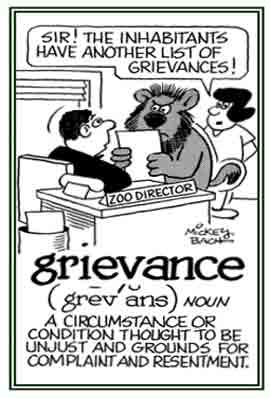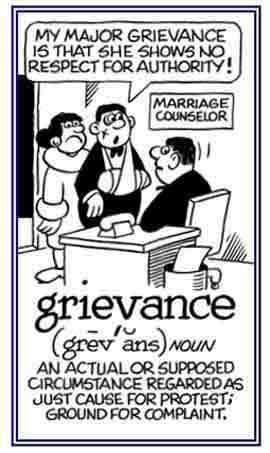-ance, -ancy
(Latin: often through French, quality or state of; being; condition; act or fact of _______ ing; a suffix that forms nouns)
2. The state of disorder; a commotion: The was such a disturbance, racket, and, loud uproar outside that night that the older couple couldn't relax and sleep at all!
3. Something that interferes with something else: The loud disturbance outside the room made it very difficult to understand the speaker.
4. An outbreak of disorder; a breach of public peace: During the disturbance in the street, the crowd of people behaved violently and two were hurt seriously.
5. In meteorology, any cyclonic storm or low-pressure area, usually a small one: The strong wind disturbances finally passed and when the forest rangers saw the damaged trees, they started to clear up the forest.
6. In geology, a crustal movement of moderate intensity, somewhat restricted in area: The earthquake caused quite a disturbance , with deep faults and folds of the earth surface.
Noncultural activities, such as freeze-thaw cycles, landslides, and simple erosion, are also such disturbances of the earth.
7. An electrical or acoustic activity that can disturb communication: One disturbance can be the undesired echoes that interrupted the signals on a radar screen.
8. In archeology, the changing or altering of an archeological context by the effect(s) of an unrelated activity at a later time:
Examples of such disturbances include dam building, farming, and heavy construction.
A disturbance is also the nonscientific removal of an artefact from its archaeological context.
2. The superior development of one body part over another: The dominance of Jill's right handedness in comparison to her left hand was seen in her writing with her right hand and also in catching a ball with her right hand.
3. As a behavior, a situation in which an individual animal has the highest status in a group: The dominance of an animal can be exemplified in terms of access to food, space, or mates, so that others consistently defer or give way to that particular animal because of importance, age, or size.
2. A strong cloth, made of fake leather and used for clothing: At the clothing store, Judy saw a nice jacket in brown durance, or imitation suede, very similar to the shoes that she had at home.
2. A satisfying, or admirable, neatness, ingenious simplicity, or precision in something.
While encumbrances usually relate to real-estate property, a purchaser of personal property is provided with a warrant (written assurance) of title against any unknown encumbrances.
2. A extra weight that causes a strain and makes something very difficult to do: Ann's extra suitcase was an encumbrance; especially, when she tried to get on the train.2. The state or fact of persevering: Through hard work and endurance, the group will successfully complete the project that was assigned to them.
3. Continuing existence; duration: All living creatures are striving for endurance or survival on Earth.
2. Incorrect or morally wrong behavior: Hans confessed his errancy and begged for forgiveness when he took money from his father's wallet when he was asleep.
3. A tendency to do wrong: the propensity for making mistakes or acting improperly: The puppy was always exhibiting errancies when she frolicked in the muddy water.
4. Holding views that disagree with accepted church doctrine; especially, a disagreement with Papal infallibility: Because of her errancies, Francis was asked to leave the church.
2. Shocking because of being so obvious: Flagrancy was displayed by the construction workers when they did not follow the necessary steps involved in building the house as evidenced when the roof flew off in the storm the following week!
3. A burning; great heat; inflammation: The wildfire in the forest produced such fragrancy that all of the campers in the area had to be evacuated immediately.
4. The condition or quality of being atrocious, heinous, and excessive: Because of the flagrancy of Susan’s dishonest and harmful conduct with her fellow student, she was sent immediately to the principal’s office.
2. An allegation that something imposes an illegal obligation or denies some legal right or causes an injustice: Some smokers have grievances against the restrictions to smoke in public places.
3. Statements in which people say they are unhappy or are not satisfied with certain things: The two labor unions filed formal grievances accusing the company of unfair labor practices.


Go to this Word A Day Revisited Index
so you can see more of Mickey Bach's cartoons.
2. An involuntary delay or an inability in starting something.
2. Unawareness of something, often of something important; uninformed.
There is one thing to be said about ignorance—it sure causes a lot of interesting arguments.
2. Electricity opposition to flow of alternating current; the opposition in an electrical circuit to the flow of alternating current, consisting of resistance and reactance.
3. The ratio of the pressure to the volume displacement at a given surface in a sound-transmitting medium.
4. Opposition to blood flow in the circulatory system.
5. Resistance of an acoustic system to being set in motion.
6. Etymology: formed from Latin impedire, "to entangle, to ensnare, to hinder"; literally, "to put feet into fetters"; from Latin im-, "in", and pedis, "chain for the feet" + -ance, "an action, state, condition".


